With her third win in a row, Ratchanok Intanon has become the most successful shuttler ever in individual events at the World Juniors. Although Elisabeth Purwaningtyas forced the 16-year-old Thai to play her first three-game match of the tournament, Intanon bagged her third consecutive title. While everyone was counting on a second title for Viktor Axelsen, the Dane was stopped by Asian Junior Champion Zulfadli Zulkiffli, who could celebrate his second title at these World Juniors, as Malaysia had already won the team event.
By Elm Vandevorst. Photos: Badmintonphoto (archives)
At 16 years of age, Ratchanok Intanon (pictured) is already a class apart. The Thai just keeps on writing history, two years ago, she was already the youngest-ever champion in Malaysia, a title which she successfully defended in Mexico and today in Taipei. Indonesian Elisabeth Purwaningtyas seemed destined to be her next victim, as she was just blown away in the first game 21-6. However Purwaningtyas’s appearance in the final was no accident and she was ready to give it her best, which she proved by winning the second game 21-18. Intanon, who hadn’t played a third game so far, wasn’t impressed. At 3-all, she took the lead, holding on until the end 21-13.
Nor does this have to mean the end for Intanon’s junior career, as she still has two more chances left to defend her title, beginning with next year, when the World Juniors will take place in Japan. However, she has already stated that her focus for 2012 is London and indeed, not only is she neck-and-neck with her compatriot Porntip Buranaprasertsuk to be the top-ranked women’s singles player in Thailand, but both girls have a shot at breaking into the world’s top 10 before the Olympics.
Once again Viktor-ious?
Viktor Axelsen became the first ever European teenager to win a singles title at the World Juniors last year. In an event normally controlled by the Chinese, Axelsen held off Korean Kang Ji Wook in the final. This year, his opponent came from Malaysia. And also Zulfadli Zulkiffli (pictured) was ready to become his country’s first champion in the singles. Despite the consistent and impressive record Malaysia has maintained in the boys’ and mixed doubles, strangely the Southeast Asian nation had failed to provide any victor so far in one of the singles events.
With a 21-18 victory in the opening game, Zulfadli came closer to achieve his dream double, as he had already become the first Malaysian to win the Asian Junior crown in India in July. Axelsen stepped up his game and convincingly held off his rival with a 21-9 second game. In the decider, it was again his Asian adversary who prevailed, this time 21-19.
Axelsen’s silver medal was still a great result, but afterwards he was still very disappointed as he wrote on his Facebook page: “I lost the final today 19-21 in the decider. The game was up and down, with a lot of mistakes.. But in the end, my opponent was more clever than I was. I never really felt that I found my highest level, and I’m very disappointed at the moment. But that’s life, and I have to learn from that, even though it’s tough at the moment.”
The 2011 World Juniors became Malaysia’s tournament, with a title in the team event, a gold medal for Zulfadli in the singles and a third one for Nelson Heg and Teo Ee Yi (pictured) in the boys’ doubles. They advanced to their second, consecutive final, one they lost last year against compatriots Ow Yao Han / Yew Hong Kheng. But this year, they learnt from their mistakes, defeating local twosome Huang Po Jui/ Lin Chia Yu 21-17 21-17. With their title, Heg and Yeo maintained their nation’s dominance in the event since 2008.
Before the start of the mixed doubles, Indonesia was already certain of the the two top spots. Only the correct order had to be decided in the final between Alfian Eko Prasetya/ Gloria Emanulle Widjaja and Roland Alexander/Nuraidah Tiara Rosalia. The latter were the slight favourites, having eliminated some top seeds on their way to the final. In what should have been an intense duel with long rallies, proved to be the exact opposite in the first game. Alexander and Rosalia easily held off their fellow citizens 21-12.
Nevertheless, the match wasn’t over yet. Prasetya and Widjaja changed strategy, resulting in a 21-17 win in the second. The deciding rubber had all the intensity the crowd was hoping for. From 16-16 all, the game went on to 20-20 all, finally resulting in a narrow 25-23 victory for Prasetya and Widjaja. Erasing three championship points, their second became the point they will remember for the rest of their life.
In the last event, the women’s doubles, Korea became the last contender who could take advantage from the Chinese delegation’s absence. Last year, Lee So Hee (pictured) had lost in the semi-finals to the defending champions, when she and Choi Hye In became the only pair to push either of the eventual finalists from China to three games.
Playing this year as veteran, alongside 16-year-old Shin Seung Chan, Lee started it off the best against Shella Devi Aulia and Anggia Shitta Awanda, taking game one 21-16. The Indonesians drew level by claiming second game, but in the end there was no stopping the Korean steamroller. Thanks to their straightforward 21-9 win, the German Junior titleholders can bring back one title back to their home country.
Click here for complete results
![WORLD JUNIORS 2011 Finals – Three is the magic number With her third win in a row, Ratchanok Intanon has become the most successful shuttler ever in individual events at the World Juniors. Although Elisabeth Purwaningtyas forced the 16-year-old Thai […]](https://www.badzine.net/wp-content/uploads/Newsflash-thumbnail.png)
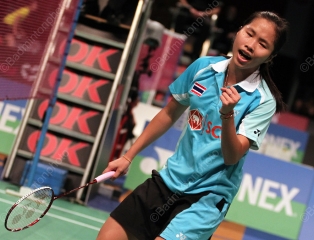
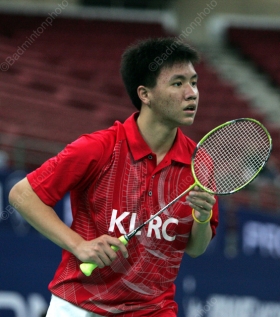
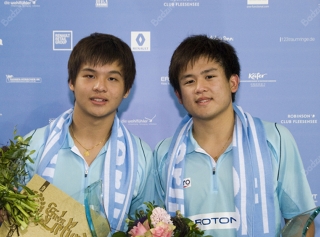
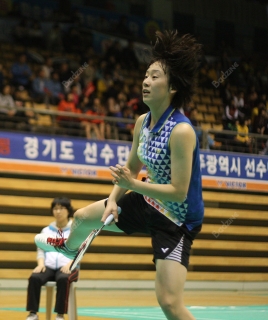
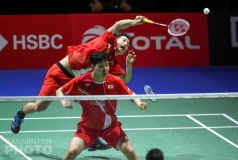
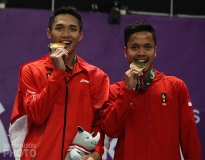
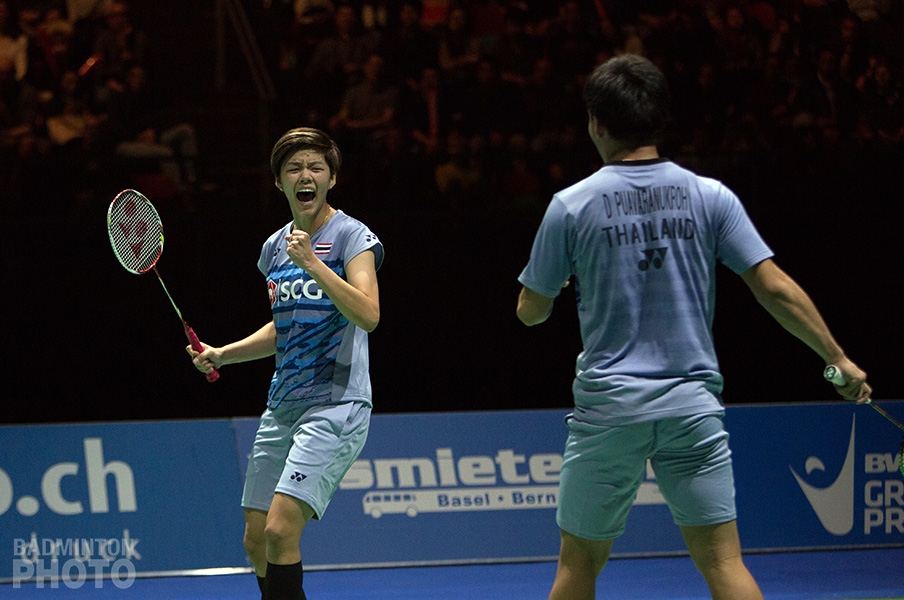



Leave a Reply